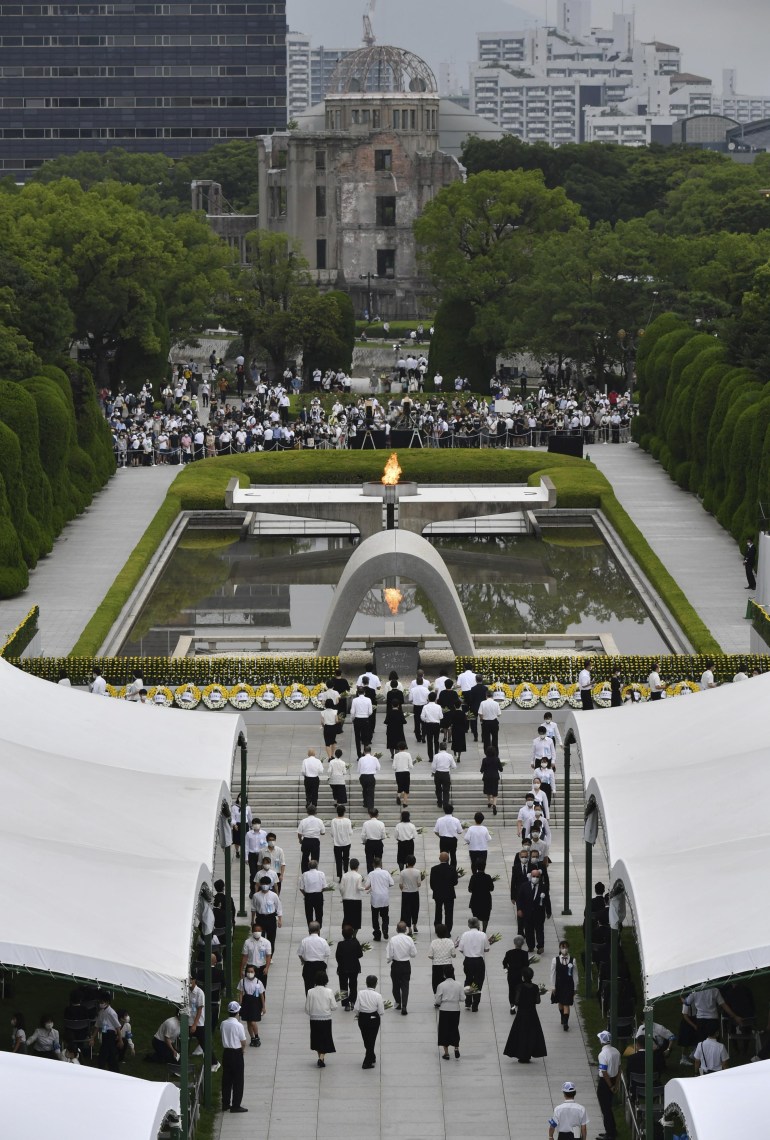Today, Thursday, Japan marked the 75th anniversary of the world's first atomic bomb attack, amid the emerging crisis of the Corona virus, which forced authorities to shorten the ceremony to honor victims.
Survivors, relatives and a few foreign figures attended the main ceremony held in Hiroshima, to pray for those who died or were injured in the bombing, and to call for peace in the world, but the authorities did not allow the public to attend, who continued to broadcast the ceremony on the Internet.
Most of the participants who personally attended the ceremony wore black clothes, put on protective masks, and prayed silently at 8:15 am (23:15 GMT Wednesday), the same time that the first wartime nuclear bomb was dropped on the city, on August 6. August 1945.
In a later speech, the mayor of Hiroshima Kazumi Matsui warned of the nationalism that led to World War II, and urged the world to unite in the face of global threats such as the Covid-19 pandemic.
"We must never allow this painful past to repeat itself. Civil society must reject self-centered nationalism and unite against all threats," he said.
For his part, Prime Minister Shinzo Abe - who has been criticized for seeking to amend a key clause in the constitution prohibiting war - pledged "to make the best efforts to reach a world without nuclear weapons and achieve peace forever." As for the Secretary-General of the United Nations, Antonio Guterres, who addressed the crowd with a video message because of the epidemic, he warned that "the only way to completely eliminate nuclear dangers is to completely eliminate nuclear weapons."
The Hiroshima bomb killed about 140,000 people, many of whom died on the spot, while others died in the weeks and months that followed, as a result of exposure to radiation and severe burns and other injuries.
Three days later, the United States dropped a second atomic bomb on Nagasaki, killing 74,000 people.
no escape
Many memorial ceremonies were canceled due to the global epidemic, which carries similar concerns among survivors of the attack, including Keiko Ogura, 83, who survived the Hiroshima bomb.
She told reporters last month that with the outbreak of the virus, "I remember the fear I felt after the bombing ... no one has escaped."
She also urged people around the world to acknowledge the need to combat common challenges together. "Whether it is the new Corona virus or nuclear weapons, the way to overcome it is the interdependence of people," she said.
The anniversary this year highlights the dwindling number of bomb survivors, called "Hibakusha" in Japan, many of whom suffered physically and psychologically in the aftermath of the attack.
Most of the survivors - who were still alive - were infants or children at the time of the attack, and their mission - to keep the memory of bombings alive and advocate for a ban on nuclear weapons - became more urgent as they grew older.
Activists and survivors have built up archives of everything from recorded testimonials of Hibakusha to their poems and drawings, but many fear that interest in atomic bombing will fade as the numbers of those who test it decline.
Untold horror
"Just storing a stack of records ... makes no sense," according to Kazuhisha Ito, general secretary of the "No More Hibakusha" NGO that collects documents and testimonies from victims.
"What we want is to arouse the interest of the youth in the matter, and exchange views with them, at the world level," he told AFP.
The historical assessment of nuclear bombing continues to cause controversy; The United States has never apologized for the bombing, which many see as ending the war.
Japan announced its surrender a few days later on August 15, 1945, and some historians say the eventual dumping of the two bombs saved lives; It allowed avoiding a ground incursion that would have probably caused more deaths.
But in Japan, the attacks are war crimes, because they randomly targeted civilians and caused unprecedented damage.
In 2016, Barack Obama became the first US president to visit Hiroshima, where he did not apologize but hugged survivors, and called for a world without nuclear weapons.
Hiroshima and Nagasaki were two major stops in Pope Francis' first visit to Japan last year, during which he condemned "indescribable horror" sparked by the attacks.

